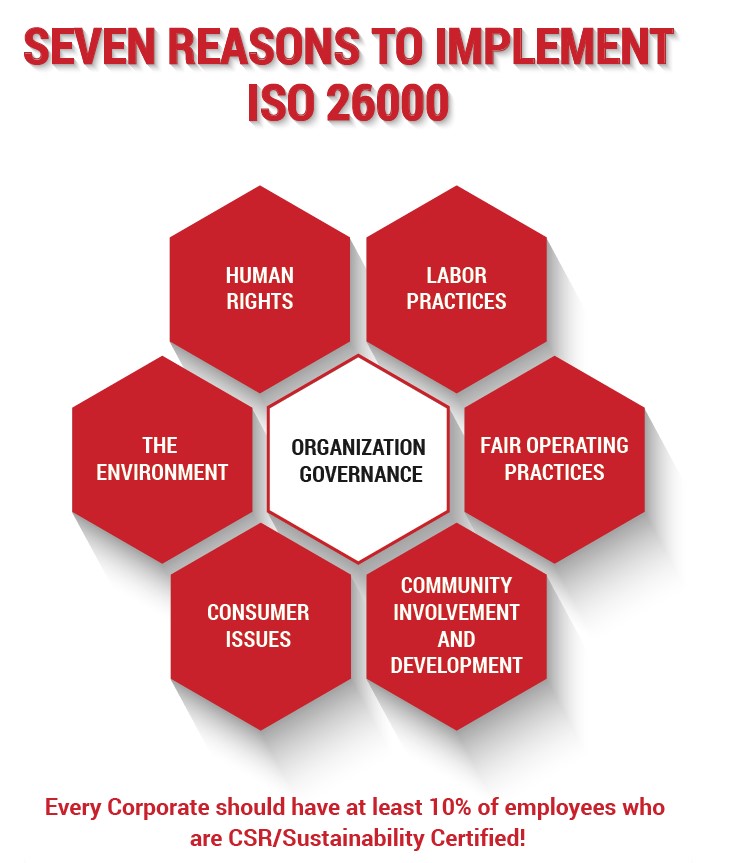In recent years, organizations around the world are becoming increasingly aware of a clear need to demonstrate practices of socially responsible behavior. The objective of the ‘organizational social responsibility’ concept is to contribute to sustainable development, through transparency and ethical performance.
To assist organizations of all types and sizes in addressing their SR, the International Organization for Standardization has published first global standard on Corporate Social Responsibility, ISO 26000. It is a voluntary guidance document that offers suggestions, advices, proposals, and recommendations of social responsibility. It helps promote credible reporting, company’s accountability and it improves market performance.
ISO 26000 is based on seven principles, seven core subjects of social responsibility defined in the standards. The organization must identify the significant issues for them to address. It is done in a prioritized manner, through involvement and dialogue with stakeholders.
ISO 26000 seven core subjects are:
• Organizational governance
• Human rights
• Labor practices
• The environment
• Fair operating practices
• Consumer issues
• Community involvement and development
1. Organizational Governance
Refers to how your business makes and implements strategic decisions, to achieve its objectives. Your decision-making processes should be structured so that the principles of social responsibility can be applied.
2. Human Rights
Human rights are basic rights to which all humans are entitled. Businesses are to respect and support human rights within their own operations and by collaborating with stakeholders.
3. Labor Practices
Labor practices in an organization must be in accordance with all policies, and actions related to the working conditions by the organization and developed on its behalf, including subcontracted work. Labor practices include health and safety of workers, hiring, promotion, training and skill development, etc.
4. The Environment
Consequences of any decision and action taken by an organization will impact the environment. This is associated with the use of resources, the location of activities, waste, and pollution. Organizations must take a closer look when approaching an environmental direct and indirect impact, in order to minimize any negative outcomes.
5. Operating Practices
This core refers to the ethical conduct, practicing accountability and fairness when doing business with others, including organization’s stakeholders and suppliers. Addressing issues such as anti-corruption, respecting the law, and promoting social responsibility through the business chain are few of the important ISO 26000 themes.
6. Consumer Issues
Organizations must be transparent to their customer about their services and products. Customers must be given the necessary information regarding the product and service provided by any organization. Fair marketing, consumer service, support, data protection and privacy are issues that establish a credible image of the organization.
7. Community Involvement and Development
Organizations must acknowledge the value of communities where their business is active in. Community’s involvement in the organization’s practices will contribute to sustainable development. Supporting skill development programs, employment creation, and social investment will have a positive outcome on both sides.


HOW CAN YOU BENEFIT FROM THE ISO 26000?
Persons with ISO 26000 Certification will bring strategic advantage to any organization and increase competitive side of the industry. Social responsibility is a representation of a positive image and guarantee of the employees’ satisfaction and customers’ trust. Professionals with social responsibility certificates are a great way to attract new investors and sponsor concerned with social responsibility and sustainable development.
PECB is continuously active in assisting organizations worldwide and society as a whole to achieve best practice using standards to provide structure and focus on training and development programs. PECB offers Training and Certification services for ISO 26000:2010-Social Responsibility, which ensures that organizations will not only improve their event organization performance but also have an international impact and independently validate their commitment to their employees through certification.
For further information, please visit ISO 26000 training courses.
Contributor:
George Ogoti is a MSC (Chemical Engineering) holder, is an International Auditor, Trainer and Consultant on SHEQFS and other systems. He has an excellent knowledge in industry’s standards having worked for over 34 years. He is also a certified auditor, trainer and implementer and has extensive coverage in Africa and the Middle East. If you have any questions, please do not hesitate to contact him: ogoti@mmcafrica.com.










